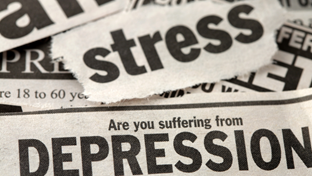Mental health conditions are common in our society. In fact, approximately 40 percent of adults in the United States struggle with anxiety and depression. As the COVID-19 pandemic rages on, the Centers for Disease Control reports that mental health disorders will continue to rise.
We live in a fast-paced world that is filled with stress. From work to finances, there is no shortage of things that can impact your mental health.
Life events that contribute to stress, anxiety and depression include:
• Loss of a loved one
• Divorce
• Illness
• Natural disasters
• Job loss
• Marital problems
• Economic uncertainty
Unfortunately, you can’t control many of these events. However, there are things you can do to minimize their impact on your life. Here are 5 ways to manage depression, stress and anxiety.
1. Get Enough Sleep
A good night’s sleep is essential for your physical and mental health. Getting enough sleep can help you lose weight, improve your mood and boost productivity. If your sleep quality is poor, apply these tips to improve it.
• Put your smart devices and computer in another room while you sleep.
• Turn off the television at night.
• Exercise during the day.
• Create a comfortable sleep environment.
• Avoid foods and beverages with caffeine.
• Get between 7 and 8 hours of sleep each night.
2. Eat Healthy Foods
Consuming too much sugar, fast food and carbohydrates can have an adverse effect on your mental health. Be sure to consume healthy foods and beverages each day. These include fruits, vegetables, fiber, water (up to 8 glasses) and lean protein.
Specific types of food that can boost your mood are:
• Salmon
• Berries
• Nuts and seeds
• Spinach
• Avocado
• Broccoli
• Dark leafy green vegetables
• Bell peppers
Prepare healthy meals in your home as much as possible. Eating nutritious foods helps you maintain a fit body and mind. Making better food choices can free you from the shackles of stress.
3. Exercise 30 Minutes a Day
Physical activities can lower your risk of heart disease, certain cancers and cardiovascular disease. In addition, engaging in physical activities provides immediate benefits for your brain including improved cognition and reduced anxiety. Exercise at least 30 minutes a day. Activities that reduce stress include walking, dancing, jogging, cycling, boxing and HIIT workouts.
4. Start a Hobby
Engaging in a hobby that you enjoy can help you relax and unwind from a stressful day. When you participate in fun activities, your brain releases dopamine. This is your brain’s chemical messenger that causes you to feel good.
Your hobbies don’t have to be grand activities that require lots of time or money. Just pick an activity that you enjoy and devote at least 15 minutes to it each day.
Examples of relaxing hobbies include:
• Play a musical instrument
• Write a book
• Cook your favorite meals
• Learn online investing
• Read books
• Learn a new language
• Produce music
• Solve puzzles
• Draw or paint pictures
• Learn to code
• Start a YouTube Channel
• Remodel a room in your home
5. Join a Professional Organization
It can be tempting to isolate yourself from others when you’re depressed or anxious. After all, being alone with your thoughts can be comforting.
Although social isolation feels good, it isn’t the best long-term strategy to deal with mental health issues. In some instances, it can worsen anxiety and depression.
Joining a professional organization such as Corporate Counsel Men of Color can connect you with other people. You can make new friends, take charge of your career and build a professional support system.
Engaging with like-minded professionals can help you see your problems in a different way and stay motivated. Want to learn more about Corporate Counsel Men of Color? Enroll in our organization today.
© Copyright of Corporate Counsel Women of Color®. All Rights Reserved. To License the Use of this Article, contact [email protected]

